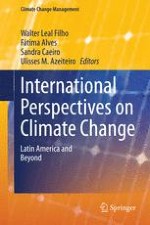2014 | OriginalPaper | Chapter
14. Making Science Count: Climate Change and the Science/Practice Interface
Authors : Harry Diaz, Margot Hurlbert
Published in: International Perspectives on Climate Change
Publisher: Springer International Publishing
Activate our intelligent search to find suitable subject content or patents.
Select sections of text to find matching patents with Artificial Intelligence. powered by
Select sections of text to find additional relevant content using AI-assisted search. powered by
